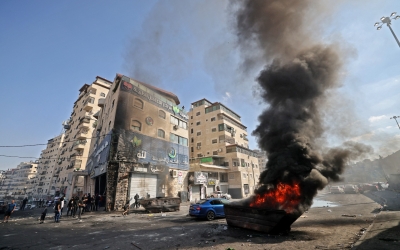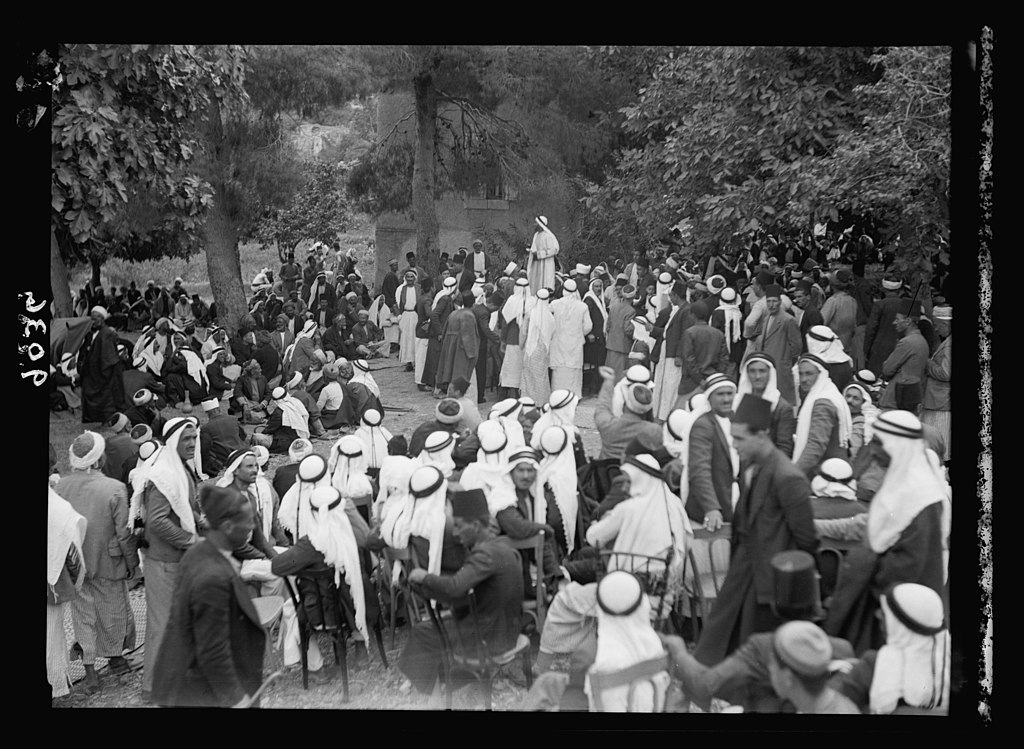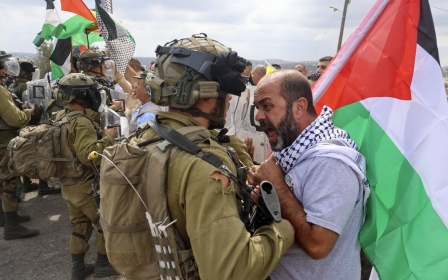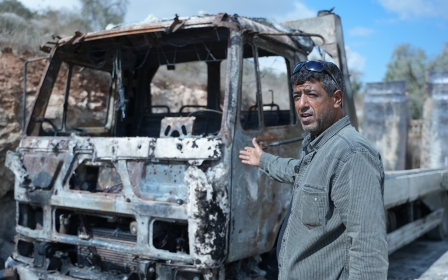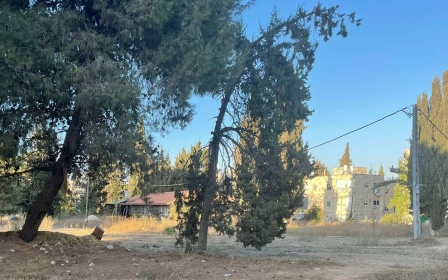Head-shaving, humour and hoax calls: How Palestinians are rallying around Jerusalem's Shuafat
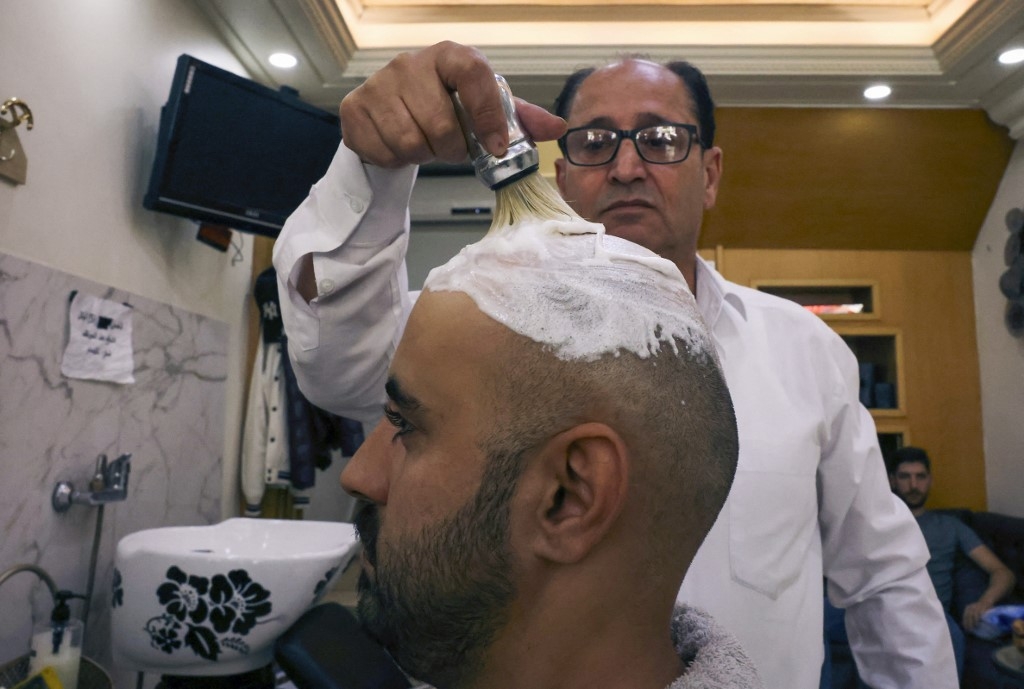
As the Shuafat refugee camp entered a second week under strict Israeli restrictions, Palestinians have turned to head-shaving and humour to rattle Israeli forces and rally around the residents of the occupied East Jerusalem neighbourhood.
But the latest trend, which includes calling out the name and imitating the hairstyle of a man wanted by Israel for allegedly shooting a soldier, has now come under scrutiny.
New MEE newsletter: Jerusalem Dispatch
Sign up to get the latest insights and analysis on Israel-Palestine, alongside Turkey Unpacked and other MEE newsletters
Sources from Shuafat camp, who spoke on condition of anonymity, told Middle East Eye that at least three bald men have been denied the right to leave the camp. A dozen others have reportedly been fired by their Israeli employers after shaving their heads.
The camp and surrounding areas have been under Israeli restrictions on movement since 8 October after a suspected Palestinian shot dead an Israeli soldier at a checkpoint leading to the camp.
A full closure of the area's two checkpoints, which left almost 140,000 people trapped in densely populated neighbourhoods isolated by Israel's separation wall, was eased on 13 October.
People were allowed to enter and leave the camp under intrusive and restrictive searches, according to residents.
The following day, families in the camp announced that they would halt a civil disobedience state they had declared, which included commercial strikes and confrontations with Israeli forces during their repeated raids of the camp.
Those methods have now been replaced by new forms of resistance, say the camp residents, which includes a haircut, WhatsApp messages and prank calls.
Viral trends
Israeli authorities last week released the details of the man they accuse of the fatal shooting outside Shuafat: a 22-year-old bald man from the refugee camp, named Udai al-Tamimi.
A small group of men from Shuafat responded to the announcement by filming themselves shaving their heads and posting it online.
Their video quickly went viral, and encouraged dozens more Palestinians across Jerusalem and the occupied West Bank to do the same thing.
Others in the camp began calling the name "Udai" repeatedly in their WhatsApp messages, in an attempt to distort algorithms in the area that could potentially be used to track and locate Tamimi's whereabouts.
"Did you change Udai's diaper?" said someone in one voice note shared online.
Others at the camp also prank-called the police.
Since the manhunt was launched, surveillance drones have been buzzing, a consistent noise in Jerusalem's sky. Some of the city's residents say the noise has been disrupting their sleep, and took their complaints to the Israeli-run emergency services.
"Zzzzzzzzzzzzzz," one disgruntled caller sounded in a phone call with a 911 operative. "My problem is that I couldn't sleep last night, the flights were zzzzz all night," another said.
Udai's name has also been shouted out loud on the streets to disturb Israeli police, similar to when Jerusalem residents kept calling out Zakaria Zubeidi's name during his five-day escape from Israeli prison last year with five other Palestinians.
Fear of repercussions
The head-shaving, the WhatsApp messages and the shouting of Udai's name all happened spontaneously, a young man, who spoke on condition of anonymity, told MEE.
"It was done as a way of showing solidarity with the people of Shuafat who have been under Israeli crackdown," he added.
The Jerusalem native preferred not to give a name because he now fears his shaven head will get him in trouble.
Like many others who MEE contacted, he was reluctant to speak to the media.
Since the head-shaving trend became popular, voices in Israel have condemned it as an attempt to disrupt police work and incite violence.
But Palestinians who spoke to MEE rejected these claims, insisting on their right to self-defence against the Israeli occupation.
'This is less about confusing the police and more about showing solidarity across Jerusalem and the rest of Palestine'
- Jerusalem resident
Israel occupied East Jerusalem in 1967 and later unilaterally annexed the city in a move not recognised by the international community. The city, including Shuafat camp, is viewed as an occupied territory that Palestinians hope would be their future capital.
Residents also argue the head-shaving campaign is meant to show solidarity with Shuafat more than anything else.
"This is less about confusing the police and more about showing solidarity across Jerusalem and the rest of Palestine," said the young man.
But fears of repercussions have now become a reality to some in Shuafat.
Israeli forces, who are still heavily manning the camp's two checkpoints, have been targeting shaven-headed men, or those who were seen calling Udai's name, at the checkpoints.
At least one person has been physically assaulted for shaving his head and others have not been allowed to leave the camp, sources from the camp told MEE.
"People have been stopped at checkpoints and asked to remove their caps. If they are bald, they are not allowed to pass," Hasan Alqam, an activist from Shuafat, told MEE.
"This only fuels the youths' determination to defy the Israeli occupation."
Rooted in history
Despite the crackdown, photos and designs of bald-headed Palestinian men have spread online, with many drawing parallels between the trend and similar solidarity campaigns in Palestine's history.
The most famous of which was during the 1936-39 revolt against the British Mandate.
At the time, Palestinian fighters mostly came from rural areas and wore the traditional Palestinian headcover, known as hatta or keffiyeh, in contrast to Palestinians who lived in the big cities and wore the fez, or tarboosh.
As such, Palestinian fighters were easily identified and pursued by the British authorities when they attacked military and police targets in the big cities.
The Arab National Committee in Nablus then issued an order to the general public, asking everyone to wear the hatta instead of the tarboosh, so fighters could easily evade British authorities.
The response was overwhelmingly positive, with cities overnight abandoning the tarboosh - widely seen at the time as a symbol of prestige and progressiveness - and replacing it with the hatta.
According to Palestinian heritage researcher Hamza al-Aqrabawi, popular support and backing for acts of resistance has been part and parcel of Palestinian history, from the earliest uprisings against British occupation in the 1920s to all the uprisings against the Israeli occupation since the early 1960s.
"Similar incidents were widespread in the first and second intifada. For example, many women would step in to protect a child being detained and say that he is her son when nothing is connecting her to him," Aqrabawi told MEE.
"Or other times when those being pursued by the Israeli army are invited into houses and given pyjamas and beds to sleep in to pretend that they are members of the family."
As such, Aqrabawi argues, the recent head-shaving campaign is a natural continuation of the community support for acts of resistance.
"Despite the risks involved to these people, they quickly showed support for such acts because they feel the person they are covering for represents their worries and hopes," he said.
"It helps them release some of the anger they feel as a result of Zionist policies that are extremely violent and barbaric."
Latifeh Abdellatif contributed to this report
Middle East Eye delivers independent and unrivalled coverage and analysis of the Middle East, North Africa and beyond. To learn more about republishing this content and the associated fees, please fill out this form. More about MEE can be found here.


